The United States is currently the country most affected by COVID-19 with more than 125,000 deaths.
From Saturday, July 25 at midnight, it will be mandatory to wear face masks at indoor public gatherings with over 100 people, including nightclubs. The Health Minister Adam Vojtěch (ANO) informed Czech Television today afternoon.
“We are not planning to close certain industries or limit the free movement of people, but prevention is needed. The measures taken are based on information from the regional hygienic stations,” said Vojtěch.
“This measure does not concern shops or restaurants, but specifically sports and cultural events,” the minister specified.
A maximum of 500 people seated in five separate sectors, each comprising 100 people, will be allowed at indoor events.
The number of cases is growing, but the risk group over the age of 65 is not affected and there are no more serious cases that require hospitalization. “However, a number of smaller outbreaks show that there may be potential for a community spread,” said the minister.
An outbreak of coronavirus linked to a music club in Prague has recently increased to 98 cases, including footballers from several of the city’s clubs.
PM Babiš stressed that the Czech Republic had managed the first wave of the epidemic very well, but expressed concerns about the daily increase in coronavirus cases.
The number of new cases in the Czech Republic has been growing significantly in recent days. On Tuesday, the country recorded 212 new positive people. On Wednesday, 247.
The number of active coronavirus infections topped 5,000 in the Czech Republic for the first time after labs reported the highest daily rise in nearly a month.
The Czech government will discuss the resumption of the Central Crisis Staff on Monday.
- If you are looking for a job in Prague, check our new job section here
- Time to move to a new flat? Rents with no commission here!
- Want to advertise your business on Prague Morning? Contact us at info@praguemorning.cz
Comet Neowise might just be the biggest space snowball in decades. After two other promising comets discovered earlier this year — Swan and Atlas — fizzled and faded away, Comet C/2020 F3 (aka Neowise) appears poised to deliver a spectacular show.
On Saturday, NASA published a picture by the Czech photographer Miloslav Druckmüller as an astronomy picture of the day.
NASA’s Astronomical Picture of the Day (APOD) is a prestigious award for the most interesting photographs of the universe, selected and supplemented of caption by astronomers Jerry Bonnell and Robert Nemiroff.
The Comet Neowise was seen above Prague Castle on 13 July 2020.
According to NASA solar system ambassador Eddie Irizarry, it should remain visible just before and around the time of first light until July 11. The comet will then dip below the horizon as it transitions from being an early riser to a cocktail hour sensation, hopefully.
It’ll start to be visible again in the evening around July 15-16. It should be a little easier to see during the second half of July when it’s a little higher in the sky.
The comet’s closest pass by Earth will be July 23, which might make for a particularly exciting viewing opportunity if the comet’s brightness continues to hold where it is or even intensifies. It’ll also rise a little higher in the sky on July 24 and 25 in case you miss the actual flyby date.
Comets are notoriously fickle things that could always break up and burn out at any moment, so fingers crossed.
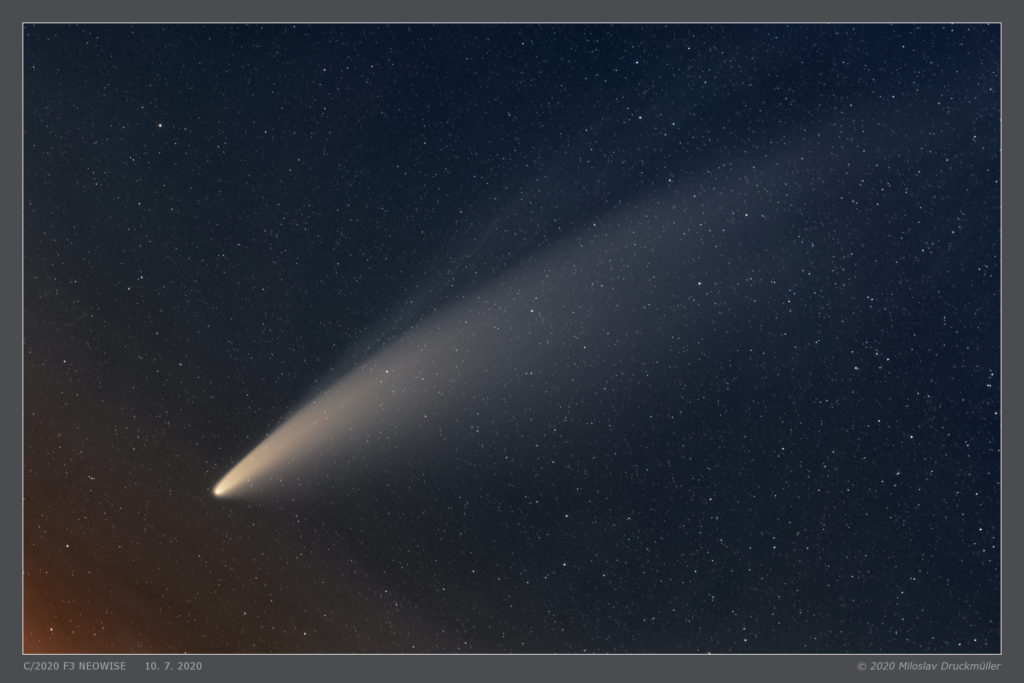
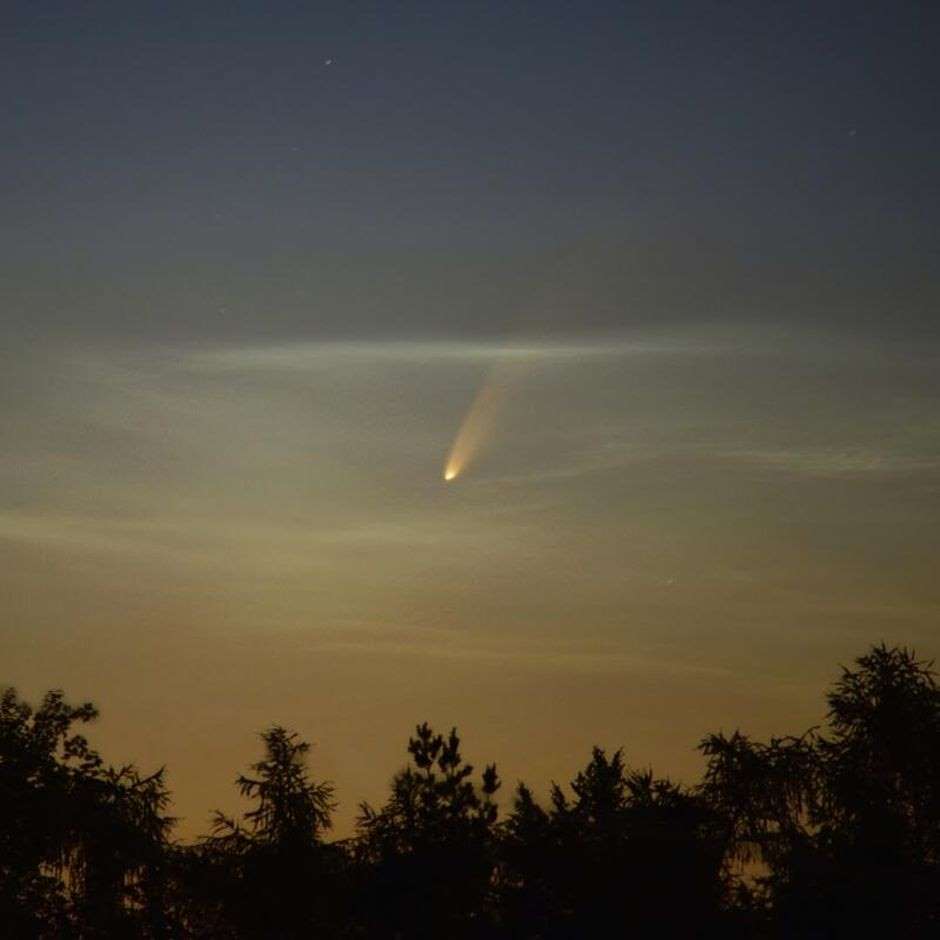
- If you are looking for a job in Prague, check our new job section here
- Time to move to a new flat? Rents with no commission here!
- Want to advertise your business on Prague Morning? Contact us at info@praguemorning.cz
The Czech government confirmed on Saturday, July 11, that Serbia and Montenegro were added to the list of countries with a high coronavirus risk.
As a result, Czechs need a 14-day quarantine or a COVID-19 test upon returning to their home country.
Serbia
Serbia recorded 18 fatalities and 386 new cases over 24 hours in what Prime Minister Ana Brnabic described as a “dramatic increase”.
A wave of new infections came after a number of sporting events were allowed to go ahead amid minimal social distancing.
These included a tennis tournament organised by multiple grand slam champion Novak Djokovic, who tested positive for coronavirus along with three other participants at his ill-fated Adria Tour.
To date, Serbia has logged 370 coronavirus deaths and almost 18,000 cases.
Montenegro
In the last 24 hours, 58 people out of 468 tested on coronavirus were conformed positive, the country’s Institute for Public Health said on Friday, the FoNet news agency reported.
It added that there were 733 active cases.
Since the beginning of June, ten people died in the coastal republic, while in the last 24 hours, five patients recovered.
Podgorica declared the end of the epidemic on June 2.
- If you are looking for a job in Prague, check our new job section here
- Time to move to a new flat? Rents with no commission here!
- Want to advertise your business on Prague Morning? Contact us at info@praguemorning.cz
The European Committee of Social Rights (ECSR) has found violations of the right to equal pay and the right to equal opportunities in the workplace in 14 out of 15 countries which apply the European Social Charter’s collective complaints procedure: Belgium, Bulgaria, Croatia, Cyprus, the Czech Republic, Finland, France, Greece, Ireland, Italy, the Netherlands, Norway, Portugal and Slovenia.
Only Sweden was found to be compliant with the Charter.
“The gender pay gap is unacceptable in modern societies, yet it continues to be one of the main obstacles to achieving real equality. European governments must urgently step up efforts to ensure equal opportunities in the workplace. And more countries should use the Council of Europe’s Social Charter as one means of reaching that goal,” said Marija Pejčinović Burić, Secretary General of the Council of Europe.
Complaints to the ECSR, which monitors the implementation of the Charter, were lodged by the international NGO University Women of Europe (UWE).
While the ECSR found that all 15 countries concerned had satisfactory legislation recognizing the right to equal pay for equal work, it found various violations – bar Sweden – primarily due to insufficient progress in reducing the gender pay gap, but in some cases also due to lack of pay transparency in the labour market, ineffective legal remedies and the insufficient powers and resources of national gender equality bodies.
Moreover, despite quota arrangements and other measures, women also continue to be under-represented in decision-making positions within private companies. The ECSR noted that the gender pay gap had narrowed in some countries, but progress was insufficient.
Background
The ECSR monitors compliance with the European Social Charter under two complementary mechanisms: through collective complaints lodged by the social partners and other non-governmental organizations (collective complaints procedure), and through national reports drawn up by Contracting Parties.
According to the Charter, the right to equal pay must be guaranteed in law. The ECSR has identified in particular the following obligations on participating States:
– To recognize the right to equal pay for equal work or work of equal value in their legislation;
– To ensure access to effective remedies for victims of pay discrimination;
– To ensure and guarantee pay transparency and enable pay comparisons;
– To maintain effective equality bodies and relevant institutions in order to ensure equal pay in practice.
RegioJet has announced it will stop selling train tickets to Ljubljana due to a change in travel conditions to Slovenia.
The train connections from the Czech Republic to Croatia will not be affected by the new restriction. The carrier allows all the passengers to request the ticket cancellation and refunds, said RegioJet spokesman Aleš Ondrůj.
Passengers will receive further information via SMS.
One-way fares tickets to Croatia cost CZK 590 per person, with the compartments available for groups. Berths in couchette coaches for individuals or groups start at CZK 790 per person.
All fares include seat reservation, free coffee, and breakfast, WiFi, and access to free entertainment services.
The service will operate three times a week between the Croatian coastal town of Rijeka and Prague, Pardubice, Brno, and Břeclav in the Czech Republic, Bratislava in Slovakia, and Csorna in Hungary.
The service will run between June 30 and September 26, and the fact that as many as 30 thousand tickets were sold in the first two weeks speaks clearly about the great interest for this offer.
The service also includes bus connections to 30 locations on the Croatian coast, which will be available for an additional fee of CZK 200 or 300 depending on the distance.
RegioJet a.s. is a private Czech provider of rail and bus passenger transport and a leading long-distance railway company in Central Europe. They have 20 million passengers a year, 11 million in rail and 9 million in bus transport.
Due to a rising number of COVID-19 cases over the past few days, Slovenia has decided to remove the Czech Republic from its “green list” of epidemiologically safe countries and put it on the “yellow list” of less safe countries, the government’s spokesman Jelko Kacin said in Ljubljana.
He explained to a press conference that the government had made the decision on Thursday and that it would enter into force as of midnight Saturday.
Czechs can freely come to Slovenia only if they own property in that country or have booked some tourist accommodation.
In addition to the Czech Republic, Croatia and France have also been demoted to the yellow list while Belgium and the Netherlands have been promoted to the “green list”.
A few days ago, Kacin explained what it means to be on the “yellow list”. “If the country is placed on the yellow list, then a Slovenian citizen or foreigner with permanent or temporary residence in Slovenia – if they come from the EU or the Schengen area – enters Slovenia without quarantine. For other persons, a 14-day quarantine is mandatory,” he said, but also stated that there are 15 exceptions to that decision.
You can find the list of exceptions here
According to Gantar, a new government decision and the tightening of epidemiological measures are needed as part of the deteriorating situation in the region, but also in Slovenia, where more and more new local infections are being transmitted after the virus was imported, especially from “red list” countries such as Serbia, North Macedonia, BiH and Kosovo.
There were 132 new COVID-19 cases reported in the Czech Republic on Thursday, bringing the total number of cases to 12,046.
7,797 of them have been recovered, 349 people died. There are currently 3,900 infected in the country.
For more info, check out the Slovenian Ministry of Interior website
The Polish-Czech border in Silesia province, southern Poland, fully reopened on Tuesday, June 30, and travelers will no longer be required to submit current coronavirus, the Czech Health Ministry said on Monday.
Earlier, people travelling to the Czech Republic from Silesia had to provide negative coronavirus tests, not older than four days, or, if positive, they were put under quarantine.
The Czech services demanded, from persons crossing the border, evidence that they had not stayed in the Silesia province and were only passing through in transit. These restrictions and border controls will expire on Tuesday.
The Czech Republic restored normal border traffic and lifted border control on internal borders of the Schengen zone in mid-June but this decision had not applied to all areas.
Poland’s Silesia was recognized as an area with a high epidemic threat and was not covered by the June 15 decision.
European Union will reopen the borders to citizens of 14 countries starting from July 1: the list includes Australia, Canada, South Korea, Japan, New Zealand, Rwanda, Thailand, Uruguay, Algeria, Morocco, Tunisia, Georgia, Montenegro, and Serbia.
Travelers from China would be approved to enter, but under the condition that Beijing would do the same for Europeans.
The document is yet to be formally agreed by the Council of the European Union next week.
Some EU countries have requested a delay in the decision for further examination, meaning the decision may be revised. The list is not entirely binding, border management remains a matter of national decision.
“There are still ongoing consultations, which will continue until Monday,” an EU source said.
“There is no visibility on where this will go, but the presidency still hopes to put this matter to a vote on Monday,” the source added.
Brussels is following a principle of a joint agreement by EU countries based on criteria such as “health status, ability to apply containment measures during travel and reciprocity considerations”.
For now, countries like the United States, Russia, and Brazil are left out, where the epidemiological situation does not offer security for fear of new outbreaks.
On March 11, 2020, the WHO declared the COVID-19 outbreak a pandemic. According to the latest statistics, over 9,724,100 people have been infected worldwide and more than 492,000 deaths have been reported.
Spain was plunged into the so-called “new normality” on Sunday, after nearly 100 days under a state of alarm due to the coronavirus crisis. passengers on a hundred or so flights landed in Spain from Schengen-area countries, with a total of 225 routes restarting – a low number compared to a normal month of June.
Spain’s Minister of Health Salvador Illa said tourists will first have to fill in a form stating exactly where they will be staying for the duration of their trip and whether or not they have previously had coronavirus. Then they will also have their temperature taken at the airport and undergo a visual inspection. Illa said that if the passenger fails one of the three checks, they will be seen by a doctor.
“We want to make sure that we welcome visitors, but we want to do this in safety and security for them, as well as for the Spaniards,” says Spanish Foreign Minister Arancha Gonzalez Laya.
Spanish officials are identifying locations where travelers “will be isolated and treated” should they require hospital treatment, according to González Laya.
Looking for a job in Prague? Visit our new job section!
Masks are required in all indoor public areas at hotels. Guests get their temperatures taken before the enter hotels restaurants.
Gloves are mandatory each time a guest requests food from a buffet, where a worker serves them. Arrows have been put on the floor to map out one-way routes for guests to keep people from crossing paths as much as possible.
Government health workers make random calls to check on the tourists. If a guest has symptoms of the covid-19 virus — a cough or a fever — authorities say they will get them tested within 24 hours. Those with positive results will be isolated in apartments the government has rented for the summer season. A team of contact tracers, which has been bolstered by 150 new hires, will seek out any people who could have been infected.
Tourism generates 12% of Spain’s GDP and supports 2.6 million jobs. In Spain’s Balearic and Canary Islands, however, the dependence on tourism jumps to over 30% of their economies.
Every Thursday evening and until the end of September, you can enjoy a unique view of Prague on the roof of the National Agricultural Museum in Letná.
The National Agriculture Museum has been recently reconstructed and restored to its 1930s look, a process that also made the roof terrace accessible.
The terrace offers unique and attractive views at Prague, including the Prague Castle, Petřín or Old Town. The garden with soft grass, a herb garden, a picnic area is great for relaxation. What is also interesting is that there are also beehives.
Aside from the smell of the herb garden, you can also rent some picnic equipment, buy some quality Czech food in the museum shop, and enjoy the amazing scenery.
Visiting the museum is an excursion into the field of agriculture, with which the people living the center of Prague really do not come across. The whole exhibition is conceived as a story that leads the visitor through the history of the hard work of farmers.
The National Museum of Agriculture was founded in 1918 but its oldest part, the museum at the Ohrada hunting lodge, started its activities in 1842. It is apparently not only the oldest specialized forestry-hunting museum in the Czech Republic but also in Europe.
The terrace is open every Thursday from 17:30 until 21:30. Adults pay CZK 50, people under 18 and seniors over 70 have free admission.
Looking for a job in Prague? Visit our new job section!
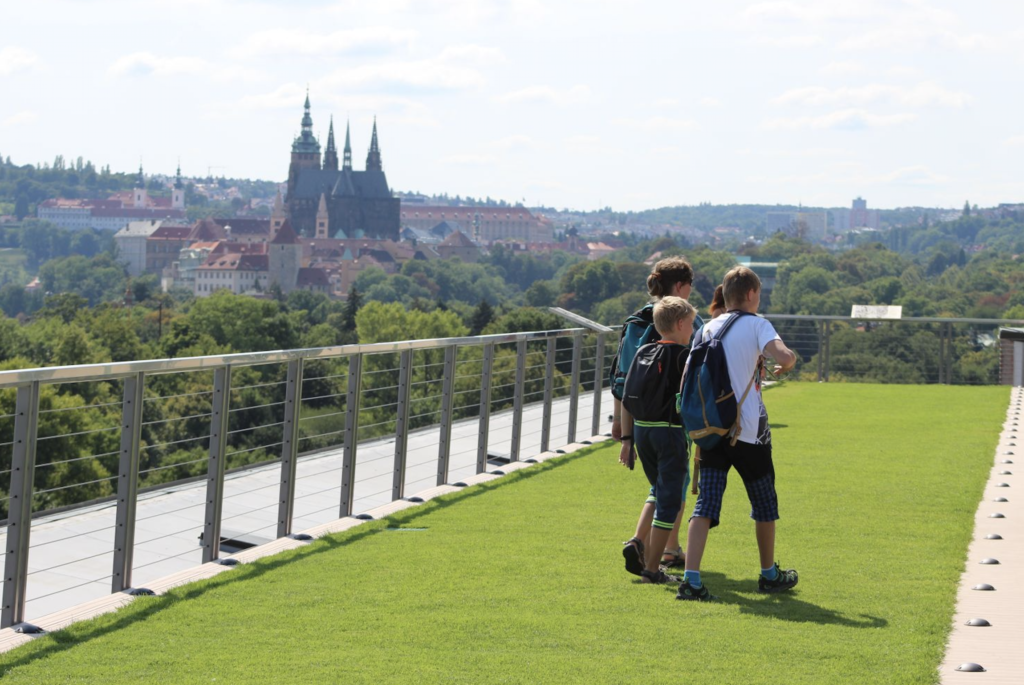

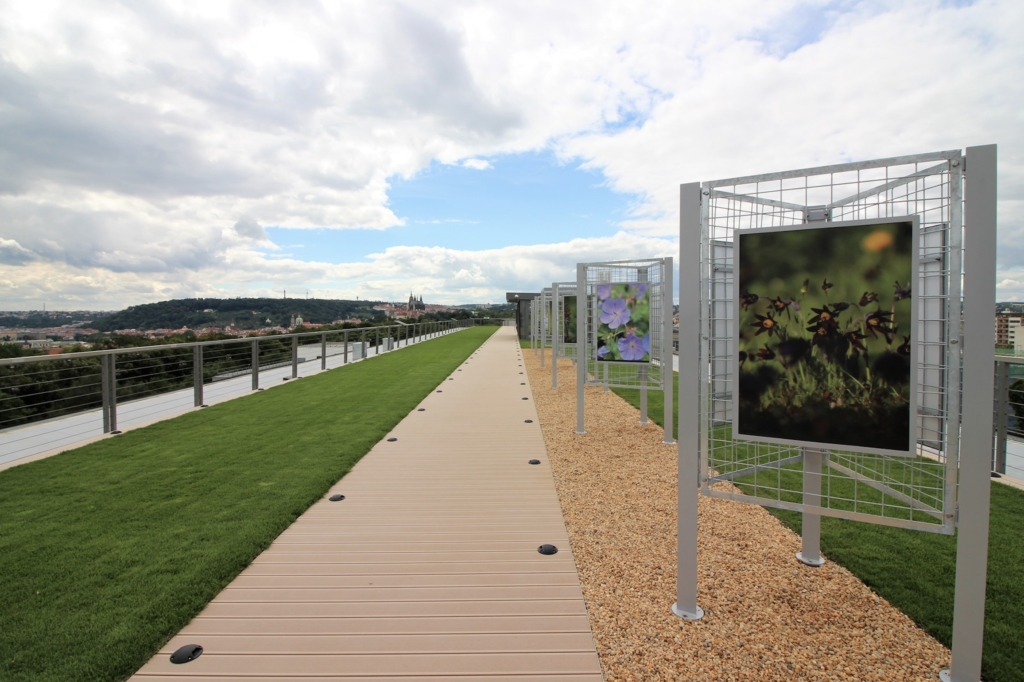
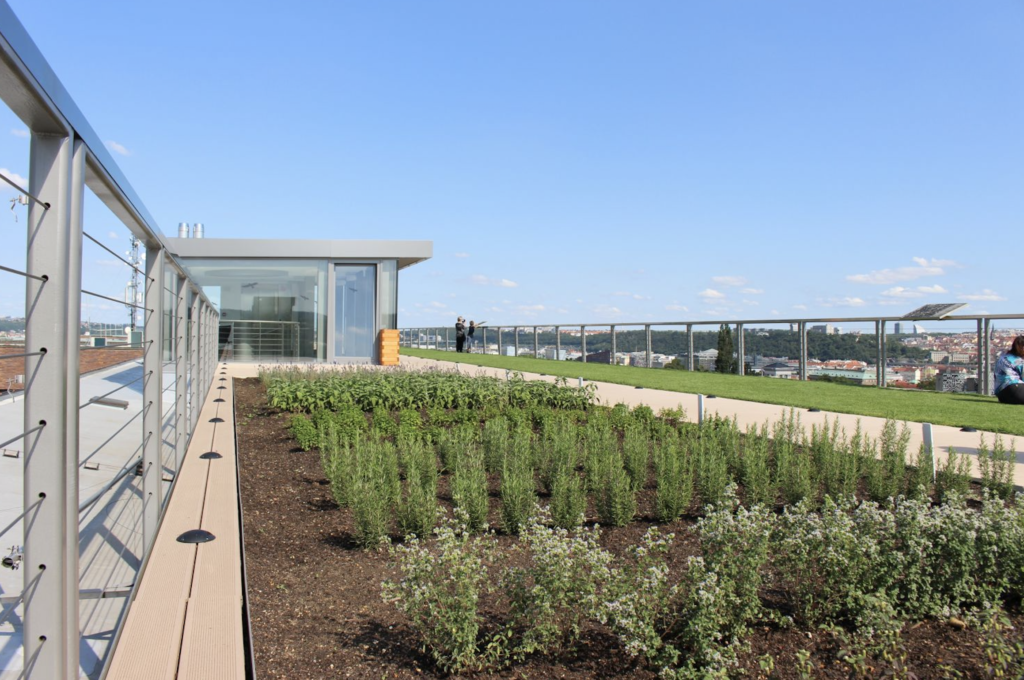
From July 1st, the Czech Republic will lift its trailblazing rule requiring face masks to be worn in public transport, a symbolic landmark in the country’s relatively successful battle against Covid-19.
Covering the nose and mouth will continue to be mandatory only in places with a higher incidence of the disease, said Minister of Health Adam Vojtěch (ANO) today.
From 1 July, restaurants and pubs can be open from 23:00 to 06:00.
Vojtěch added that the regulation would still apply in areas of localized COVID-19 outbreaks (Prague and the coal mine region of Karviná). However, the situation could change in the next two weeks.
As of June 22, 5,000 people can take part in public events if people are divided into sectors, Vojtěch added. From Monday, trade fairs with maximum participation of up to 5,000 people at the same time will also be allowed.
“If the situation develops well, half of the football stadiums could open from 1 September,” said epidemiologist Rastislav Maďar.
The Czech Republic was among the first countries in Europe to close its borders against the spread of coronavirus, on 12 March, ordering the closure of most business days later.
But the mask edict – in common with Slovakia – quickly became the symbol of the Czech fight against the pandemic, prompting debate in other countries over whether they should follow suit.
The number of confirmed coronavirus cases in the Czech Republic reached 10,162 on Thursday morning. 7,399 people have fully recovered from COVID-19.
To prevent the spread of the COVID-19 pandemic, countries around the world have taken a variety of restrictive measures.
First 2020 numbers already show their significant impact on air transport for all 13 EU Member States according to an analysis conducted by the European Statistical Office (Eurostat): Czech Republic, Denmark, Germany, Croatia, Italy (see country note), Cyprus, Lithuania, Luxembourg, Hungary, Malta, Slovenia, Slovakia, and Finland.
Prague Airport is one of the most negatively affected airports in Europe: the number of passengers fell by more than 800,000, amounting to a drop of 65 percent year-on-year.
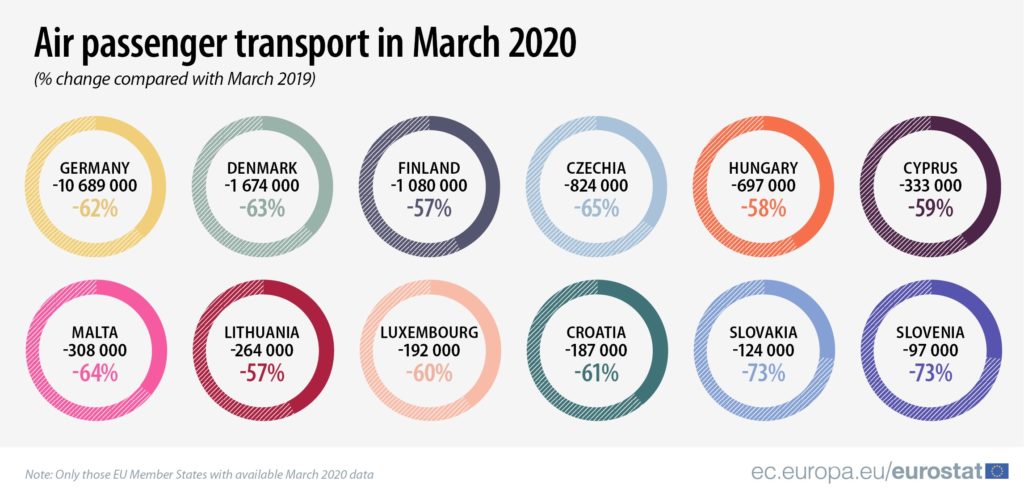
Prague Airport, together with Berlin’s Tegel and Schönefeld airports and Munich Airport, showed the largest percentage decrease when it comes to passengers handled. All four hubs had about 65 percent fewer travelers in March.
However, when considering absolute numbers, the number of passengers fell the most in Frankfurt by a total of 3.5 million.
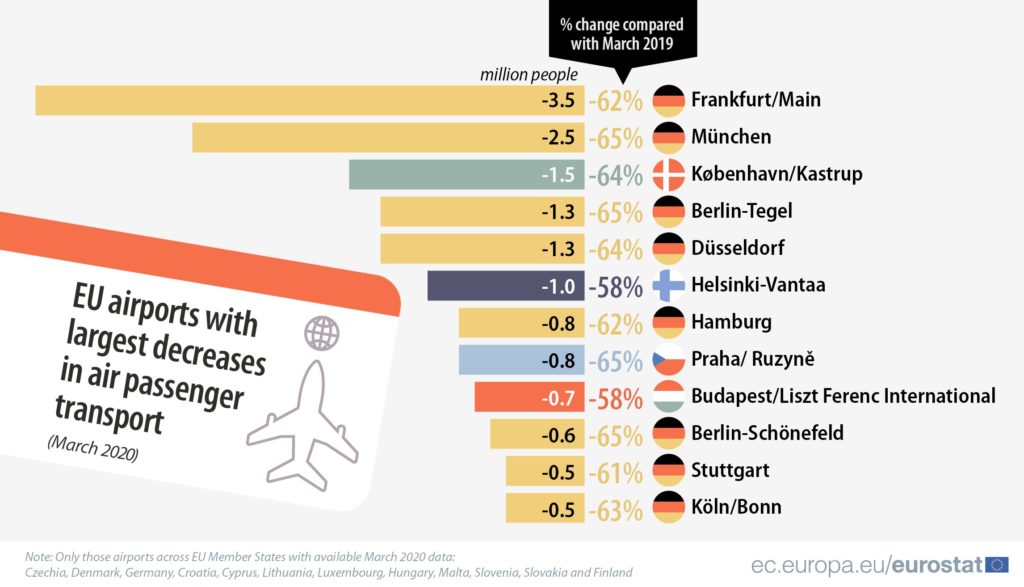
“None of the dozen EU airports shows a deeper percentage drop in the numbers of checked-in passengers than Prague’s airport,” said economist Lukáš Kovanda from the Czech Fund.
He also added that in January and February of this year, the number of passengers handled at Prague Airport was higher year-on-year, exceeding the value of one million in both months.
Whilst the number of air passengers in some of these EU Member States started to decrease already in February 2020, the number of passengers at least halved in all of them in March 2020.
Compared with March 2019, the largest decreases in numbers of passengers were observed in Italy (-85%, -11.9 million (see country note)), Germany (- 10.7 million passengers carried, -62%), Denmark (-1.7 million, -63%), Finland (-1.1 million, -57%), Czechia (-0.8 million, -65%) and Hungary (-0.7 million,
